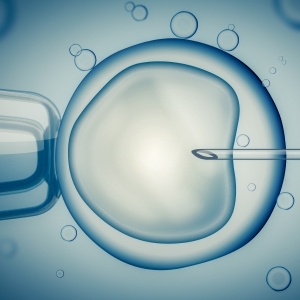In-Vitro Fertilisation (IVF) is the medical procedure of fertilising a woman’s egg with her husband’s sperm in a laboratory glass dish.
It starts with the extraction of eggs from the woman and obtaining semen from her husband.
This was shared by Assistant Professor Yong Tze Tein, senior consultant of the Obstetrics and gynaecology Department, Singapore General Hospital at I Love Children’s Know Your FERTILITY WELLNESS lunch time talk, “Is IVF Really Suitable For Me?” held at the ChinaTown Point on 6 July 2017.

She said: “The extraction of eggs may be performed under sedation or general anaesthetic. If under sedation, the woman will be awake during the procedure and able to immediately inform her doctor should she experience any discomfort.”
Depending on the women, sometimes a few eggs to usually about 10-20 eggs are extracted.
On the same day, husbands are led to private rooms within the same centre to produce semen samples.
After the extracted eggs are successfully fertilised, the embryos are allowed to grow for a few days. They are then placed into the uterus of the woman with a catheter that is passed through the cervix.
A two-week wait period is then required before pregnancy test to confirm if the procedure was successful.
So now that we know what IVF is, who should consider it?

According to Dr. Ethiraj Balaji Prasath, head & chief embryologist of Thomson Fertility Centre, who was one of the speakers at the ILC Know Your FERTILITY WELLNESS lunch time talks, despite popular beliefs that IVF is “the way to go”, it should be every couple’s last resort.
The first step, advises Dr. Balaji, are fertility health check-ups.
This is especially important for couples below the age of 35 who have been unsuccessful at conceiving despite actively trying for a year and for couples above 35, to go for the check if they have been unsuccessful after six months of trying.
“Remember that having a baby takes time and planning. It does not happen overnight. So, arm yourself with all the crucial information you need…early.” – Dr. Balaji
Female fertility Chances of natural conception (Per month)
Age About
20 to 24 years Up to 25%
25 to 29 years 15%
30 to 34 years 10%
35 to 39 years 5%
Above 40 <5%
Dr. Balaji said: “Like female fertility, the quality and quantity of sperm in men also decreases after 35. In fact, according to the World Health Organisation, the quality and number of sperm that the average man produces has dropped from 50% to 4% in recent years. This is due to a myriad of reasons from lifestyle choices to stress levels.”
Fertility health check-ups allow couples to understand their chances of natural conception early.
Consequently, this will enable doctors to provide tailored advice to help couples with conception.
If IVF treatment is recommended as the best option, couples are also provided with counselling to help them prepare emotionally.
While women do have to bear more of the emotional and physical demands of IVF treatment, A/P Yong highlights that husbands play an important role too.
They provide the much-needed support and encouragement that their wives will require throughout the treatment period.
For unsuccessful pregnancies, doctors will advise if they think a second cycle of IVF treatment will yield better results.
On the other hand, to ensure women do not get ovarian hyperstimulation syndrome, doctors vigilantly monitor the hormone medication that is prescribed.
To help with the cost of IVF treatments, the government does offer up to 75% in subsidies for eligible couples seeking Assisted Reproduction Technology (ART) treatment in public hospitals.
The subsidies provided are for a maximum of 3 fresh and 3 frozen ART cycles.
| Singapore Citizen (SC) Couple | SC-PR Couple* | SC-Foreigner Couple* |
Fresh (x3) | 75%; up to $6,300 | 55%; up to $4,600 | 35%; up to $3,000 |
Frozen (x3) | 75%; up to $1,200 | 55%; up to $900 | 35%; up to $600 |
“You may want to wait to accumulate some wealth before having a child but it never happens. By the time, you save $50,000 for your child, the value of that sum of money would have decreased. So, waiting to have enough money is simply a chasing game….that in reality might hinder your chances of a successful pregnancy.” – Dr Balaji
Questions and Answers
1) Are there any risks associated with IVF?
One of the obvious risks is that of an unsuccessful pregnancy. Then the doctor will recommend trying a second cycle of IVF if chances of a successful pregnancy are high.
The other risk is that of the women getting Ovarian Hyperstimulation Syndrome. To eliminate this risk, doctor usually carefully monitors the dose and amount of hormone medication that is prescribed.
2) I’m 32 and have been trying for 5 years for a baby. I’ve done a fertility check but can’t find any issues. Should we still wait before going for IVF?
Don’t wait, even with IVF as the chances of a successful pregnancy does reduce significantly after the age of 35.
3) Will an IVF treatment be painful or uncomfortable?
No medical treatment is without slight pain or discomfort. Most patients attest that the levels of pain and discomfort are manageable.
Additionally, if it gets too painful or uncomfortable, you can immediately alert your doctor who will then take the necessary steps to alleviate your pain and discomfort.
4) How would we know if we need to go through IVF?
Upon completing a fertility health check-up, your doctor will be able to advise you and your spouse if IVF treatment is the best option.
5) What are the assisted reproduction technologies available for couples who are trying to conceive?
The In-Vitro Fertilisation (IVF) process involves fertilising eggs retrieved from the wife with sperm contributed by the husband in a laboratory dish and then transferring the fertilised embryo back into the wife’s uterus.
The Intrauterine Insemination (IUI) process involves placing the husband’s sperms directly inside the wife’s uterus to facilitate fertilisation.
The goal of this is to increase the number of sperm that reaches the fallopian tubes, thus increasing the chance of fertilisation.
6) What are the steps for IVF and how long will an average process take?
The average timeline is about two months from start to end.
The process starts with the women taking prescribed hormone medication to encourage the production of eggs and prescribed supplements for the men to improve the quality of sperms.
Thereafter, particular eggs are retrieved and fertilised with the contributed sperm in the laboratory. The fertilised embryos are then transferred back into the uterus.
Two weeks later, a pregnancy test will be done to confirm if the procedure is successful.
7) What are some of the reasons for an unsuccessful IVF treatment?
There are many reasons for an unsuccessful IVF. Age plays a big part so the older the wife and husband are, the lower the chances of success.
The success of IVF treatments also depend on factors like uterine lining health and existing health issues like endometriosis.
I Love Children thanks A/P Yong Tze Tein, senior consultant of the O&G Department at SGH and Dr. Ethiraj Balaji Prasath, head & chief embryologist of Thomson Fertility Centre for their input.




